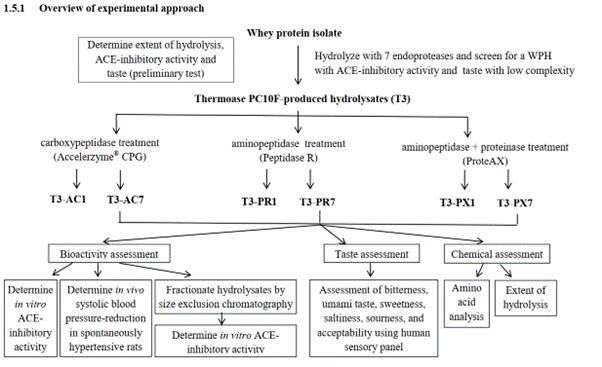Better than a Spoonful of Sugar
While Whey protein hydrolysates (WPHs) may reduce hypertension, their usage in food is limited because the conventional approach to make WPH using enzymatic hydrolysis may result in bitterness. However, Cheung finds that treating WPHs with exopeptidases—enzymes that remove terminal amino acids from peptides—can reduce bitterness while maintaining or even enhancing their antihypertensive properties. This shows how a simple change can dramatically change our lifestyle.
Whey protein hydrolysates (WPHs) have been identified as potential sources of natural ACE inhibitors, which can help manage hypertension. However, the conventional approach often involves using enzymatic hydrolysis to produce bioactive peptides, but the resulting bitterness limits their deployment in foods. However, Cheung finds that treating WPHs with exopeptidases—enzymes that remove terminal amino acids from peptides—can reduce bitterness while maintaining or even enhancing their antihypertensive properties.
For future research, it would be interesting to explore the long-term stability of these exopeptidase-treated hydrolysates how different types of exopeptidases and their combinations can affect the properties of certain types of molecules
Cheung, L. K. Y. (2014). Effects of Exopeptidase Treatment on Angiotensin I-Converting Enzyme Inhibitory Activity, Antihypertensive Activity, and Taste of Whey Protein Hydrolysates (Master's thesis, University of British Columbia).
Introduction to the Study:
The research focuses on improving the properties of whey protein hydrolysates (WPHs), which are known for their potential health benefits, especially in managing hypertension.
WPHs have angiotensin I-converting enzyme (ACE) inhibitory activity, which can help lower blood pressure, but they often taste bitter, making them less appealing as food ingredients.
The study explores whether exopeptidase treatments can reduce the bitterness of WPHs while maintaining or enhancing their beneficial properties.
Significance of the Research:
The research is important because it addresses the challenge of making functional foods both effective and palatable.
By reducing the bitterness of WPHs, the study could make these health-promoting ingredients more widely acceptable to consumers.
It also contributes to the field of nutraceuticals, where there is a growing demand for foods that provide health benefits beyond basic nutrition.
Experimental Procedure:
Three different exopeptidases (enzymes) were used to treat the WPHs: Accelerzyme® CPG (carboxypeptidase), Peptidase R (aminopeptidase), and ProteAX (a combination of aminopeptidase and proteinase).
The hydrolysates were treated with each enzyme separately, and the resulting samples were analyzed for their ACE-inhibitory activity and bitterness.
In vitro assays were used to measure the ACE-inhibitory activity, while a trained sensory panel conducted taste tests to assess bitterness and other flavor attributes.
Key Findings:
Retention of Bioactivity: All exopeptidase-treated WPHs maintained high ACE-inhibitory activity, similar to untreated hydrolysates, meaning their potential to help manage blood pressure was not reduced.
Reduction in Bitterness: The treatment with exopeptidases significantly reduced the bitterness of the hydrolysates, making them more acceptable for use in food products.
Enhanced Taste Profile: In addition to reduced bitterness, the treated WPHs had increased umami and saltiness, which could enhance their appeal in various foods.
Antihypertensive Effectiveness: The treated hydrolysates were shown to effectively lower systolic blood pressure in hypertensive rats, confirming their potential health benefits.
Future Research Directions:
Explore the stability and effectiveness of the treated hydrolysates in various food matrices and over extended storage periods to determine their practical applications in real-world settings.
Investigate the use of different combinations of exopeptidases to optimize both the health benefits and taste of WPHs, potentially creating customized treatments for specific food products.
Study the effects of exopeptidase treatments on other bioactive peptides and proteins to expand the range of functional food ingredients available for development.


